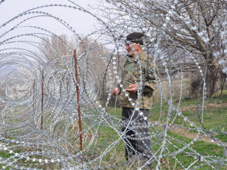
Council of Europe discusses report on the occupied regions of Georgia
By Tsotne Pataraia
Friday, November 15
On November 13, 2019, the Committee of Ministers of the Council of Europe discussed the 20th consolidated report of the Secretary-General on the conflict in Georgia. This report covers the period from April to September 2019 and describes the human rights and humanitarian situation in the occupied territories of Georgia during the reporting timeframe.
The statement of the Council of Europe expresses concern over the deteriorating human rights and security situation in the occupied regions of Georgia. Following the report, the human rights abuses such as unlawful detention, unprecedented restrictions on freedom of movement and erection of barriers divide families and communities, increase the number of internally displaced persons and limit access to education in their native language.
Council of Europe has expressed concern over the impunity for gross human rights abuses in the occupied regions and emphasized the importance of proper investigations into the cases of human rights abuses in the occupied regions of Georgia and along the occupation line and the grave humanitarian consequences of the illegal actions by the occupation regimes. The report also draws attention to the fact that the closure of the crossing points further complicates the situation of the local population:
“Regrettably, the so-called “borderisation” process continued during the period under review, restricting freedom of movement, depriving the local population of livelihoods and undermining human security,“ reads the report.
It is noted that representatives of the Georgian government assess the recent developments in the Tskhinvali region as alarming. It also is emphasized that the death of Margo Martiashvili in Akhalgori district is the latest tragic example of restriction of free movement. The EU stresses the need to immediately open all the so-called checkpoints in the Tskhinvali region.
The report also provides information on restrictions on education in the mother tongue of the occupied regions of Georgia:
"Furthermore, the growing restrictions on freedom of movement appear to be increasingly interfering with the effective enjoyment of the right to education in the mother tongue,” the report says.
At the same time, it is noted that the practice of illegal detention exacerbates the human rights and humanitarian situation:
“A strict arbitrary detention practice continues to be enforced for those who cross outside authorized points and violate the crossing “rules”, raising major issues from human security and human rights perspective,” reads the statement.
The Secretary-General also refers to the rounds of international negotiations in Geneva during the reporting period, emphasizes that the talks focused on the closure of so-called crossing points in the occupied regions, freedom of movement, the right to education and the right to health, the deprivation of life of a Georgian citizen on the Russian military base in the occupied Gali region. The report notes that the Co-Chairs of the Geneva International Discussions emphasize underline the need for the immediate lifting of illegally imposed restrictions that hurt the daily lives of local people. Besides, the report focuses on the need for incident prevention and response mechanisms in Gali to be restored.
The report also discusses confidence-building projects. The projects are implemented with the involvement of the Council of Europe and aim to build trust and dialogue between the participants.


